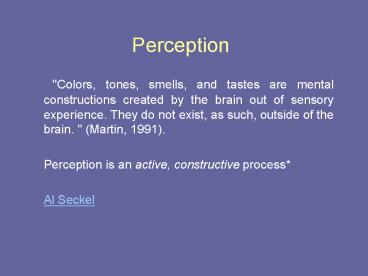Perception PowerPoint PPT Presentation
1 / 31
Title: Perception
1
Perception
- "Colors, tones, smells, and tastes are mental
constructions created by the brain out of sensory
experience. They do not exist, as such, outside
of the brain. " (Martin, 1991). - Perception is an active, constructive process
- Al Seckel
2
Does perception exist outside of awareness?
- Subliminality
- Selective Attention Focus of conscious awareness
on a particular stimulus. Cocktail Party
Phenomenon - Change and Inattentional Blindness
- djs_lab demos
- Viewable/Downloadable Examples
3
Perceptual Organization
- Gestalt Psychology Late 19th/early 20th field
that emphasized the human tendency to organize
pieces of information into meaningful patterns or
wholes (Max Wertheimer, W. Kohler, F. Koffka) - The brains tendency to organize sensory stimuli
in order to construct reality helps to explain
our susceptibility to illusions
4
Gestalt Grouping Principles
- The perceptual tendency to organize stimuli into
coherent groups (Law of Pragnanz or good order).
We tend to order experience in a manner that is
regular, orderly, symmetric, and most simple - proximity--group nearby figures together
- similarity--group figures that are similar
- familiarityfamiliar or meaningful pattern
- continuity--perceive continuous patterns
- closure--fill in gaps
- connectedness--spots, lines, and areas are seen
as unit when connected - common fate--when objects move in the same
direction, we see them as a unit - Gestalt
5
Kanizsas Illusory Triangle
- Illusory and Subjective Contours-Creating images
where they do not exist
6
Perceptual Organization
- Among our most basic perceptual tasks is a type
of selective attention where we distinguish
objects as separate from their surroundings, a
concept known as. . .
7
Infamous Rubin
8
Which picture predominates for you, the younger
or older woman?
9
(No Transcript)
10
Reversible figures
- Like with figure ground images in the following
illustrations the relationship between the
objects continually reverses. - Perceptual hypothesis Contends that we bridge the
gap between whats real and what we see by
constantly making and testing hypotheses
11
The Necker cube
http//dogfeathers.com/java/necker.html
12
Binocular cues
- Retinal disparity and stereopisis The brain
perceives distance and depth by comparing the
different images received by each eye - Convergence Eyes come together as objects are
nearer
13
- Stereograms (like 3-D movies) exaggerate retinal
disparity by placing two slightly separated
images apart. The brain actively reconstructs
the images into a 3-D illusion
14
Monocular cues
- Interposition/Superposition
- Relative clarity/aerial perspective
- Texture gradient
- Relative height
- Relative size
- Light and shadow
- Linear perspective
- Motion parallax
15
(No Transcript)
16
Paris Street A Rainy Day Gustave Caillebotte
17
(No Transcript)
18
Pavement Drawings
- Julian Beever
19
Illusions you should know (and their possible
explanations)
- Figure-ground
- Reversible figures (Necker cube)
- Illusory contours (Kanizsa triangle)
- Size-distance illusions (Ames Room, Muller-Lyer
Ponzo illusion) - Impossible figures (role of perceptual
set/schema) - Think gestaltTop down processing (perceptual
hypothesis)
20
Size-Distance Illusions
- In each of these examples, the top and bottom
lines are actually the same length. - In each case the top line looks longer. Because?
- Mueller-Lyer Illusion
21
Ames Room
- Monocular depth cues give the illusion that the
two people are equally far away Ames
22
The Ponzo Illusion
- What misassumptions cause this illusion?
23
The monocular cues of linear perspective and
relative size are responsible for this illusion.
How? Shepard's Terror Subterra
24
More Perception Terms
- Real vs. apparent movement
- Autokinetic effect/illusion
- Stroboscopic motion
- Phi Phenomenon PHI Phenomenon Activity
- Induced movement (stationary-moon)
- Moving Aftereffect (MAE) spiral
aftereffect/waterfall illusion Motion Aftereffect - Motion induced blindness (VSR) MIB
- YTMIB
25
Motion Illusions
- Freezing Rotation Illusion
- Motion Induced Blindness
- Stepping feet Motion Illusion
- Stereokinetic Phenomenon
- Motion-Bounce Illusion
26
Perceptual Constancy
- Perceiving objects as unchanging even as
illumination and retinal image change - color
- shape
- size
27
Contrast and Color Illusions
- Grid Illusions Hering
- Wertheimer-Koffka-Ring
- Munker-White Illusion
- Adelson -- Checker-shadow illusion
- Lilac Chaser
- Cool Escher-inspired movie An impossible Movie
- Beau Lotto
28
The Stroop Effect
- Stroop found that the act of reading could
interfere with your ability to perform simple
perceptual distinctions like naming colors - Stroop Lab Introduction
29
Other Misleading Cues and Line Illusions
- Hering Illusion
- Café Wall Illusion
30
Impossible Figures
31
(No Transcript)

